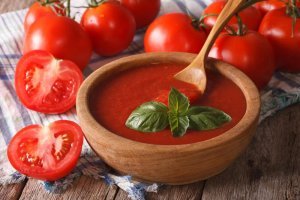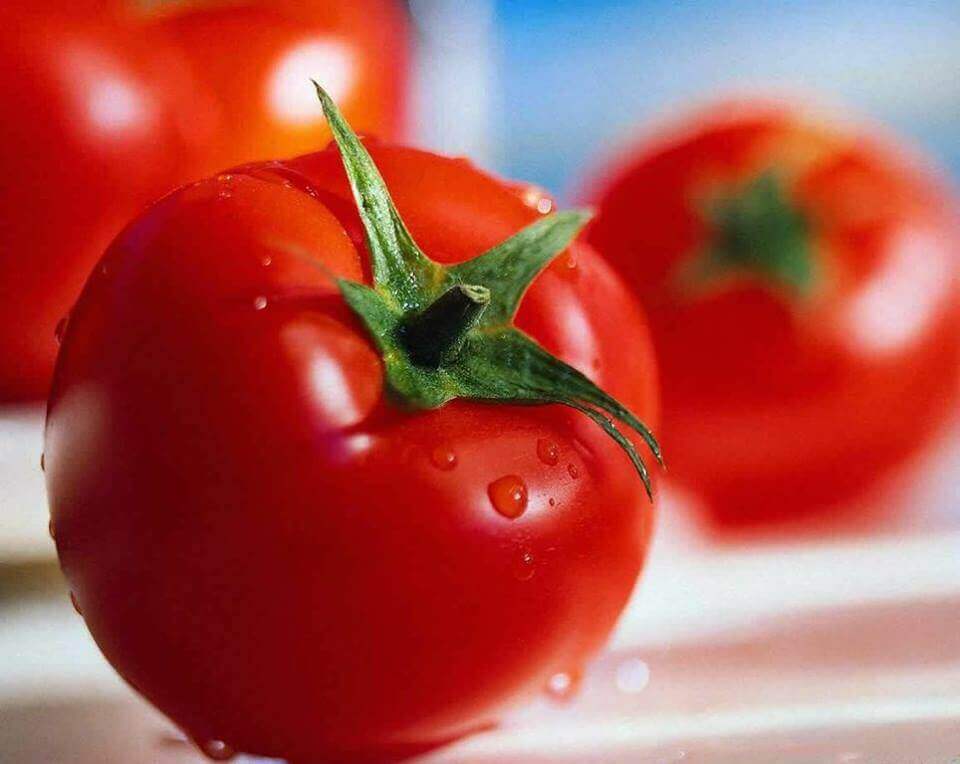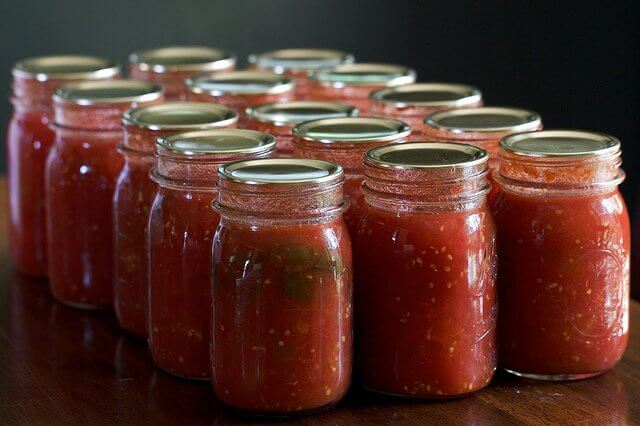Why You Should Eat Homemade Tomato Sauce Every Day

When you make your own homemade tomato sauce, you’re in a position to get the most out of the lycopene in tomatoes. Plus you get a chance to incorporate other healthy ingredients.
Tomatoes may be a very common vegetable, but they have amazing health benefits. Some studies have demonstrated their ability to help prevent certain types of cancer, thanks to the lycopene in them.
In this article, find out why you should have homemade tomato sauce every day to prevent and improve a wide variety of health problems.
What is lycopene?
Lycopene is a pigment present in fruits and vegetables of reddish colors (also violet and orange). Lycopene is in the following foods:
- Tomatoes
- Red pepper
- Watermelon
- Papaya
- Guava
- Strawberry
- Pink grapefruit
Lycopene is a carotenoid that your body can’t synthesize itself; it’s only found in plant foods. Therefore, the only way to get this is by consuming foods that contain it.
- Once ingested, lycopene is absorbed in the intestines and deposited in the liver, testes, prostate, and adrenal glands after approximately half an hour.
- Lycopene is a powerful antioxidant, which will help fight the damage that free radicals cause and that triggers cellular aging.
Check this out too: Antioxidant and Anticarcinogen Homemade Tomato Sauce
Tomatoes or tomato sauce?

Lycopene concentration per 100 grams:
- Raw tomato: 2,573 μg
- Ketchup: 17,716 μg
- Tomato sauce: 28,764 μg
- Dried tomato: 45,900 μg
Health benefits
Consuming foods, like tomatoes, that are rich in lycopene is good for you in many ways, including the following:
Cancer prevention

As indicated at the beginning of this article, studies show that the lycopene in tomatoes may help prevent some cancers, such as prostate, lung and stomach cancer. There were also positive results in preventing cases of pancreatic, colorectal, esophageal, oral and breast cancers.
Cardiovascular system
The daily consumption of tomatoes also provides many other health benefits. Another one is that they support your cardiovascular system since they improve cell activity and the use of fat for fuel. Thus, your triglyceride levels and cholesterol should go down.
Blood pressure

Lycopene has the power to control blood pressure without detrimentally altering it because it helps thin your blood. Therefore, it’s appropriate for people with hypertension.
Diabetes
For people with diabetes, regularly consuming tomatoes and other red vegetables improve the way the body utilizes glucose. It also helps insulin work well and prevents certain symptoms of diabetes, such as:
- Retinopathy
- Diabetic foot
- Intermittent claudication
Therefore, lycopene is very good for treating and preventing diabetes.
The best way to consume tomatoes

As mentioned above, tomato concentrate is the best way to consume high amounts of lycopene. However, this antioxidant is not always absorbed the same way; it depends on what food it’s in and what other nutrients it is consumed with.
Absorption improves significantly if we consume tomatoes with good quality fat and at a high temperature. That’s why the most effective, healthy way to consume tomatoes is in a homemade tomato sauce, made with extra virgin olive oil at a high temperature.
You can make it even healthier if you add a touch of black pepper and turmeric. This way, you’ll also make it into an excellent remedy for all kinds of inflammation and pain.
See also: 7 Reasons To Eat Tomatoes 7 Days a Week
Ingredients
- 10 ripe tomatoes
- 4 garlic cloves
- ½ cup of extra virgin olive oil (100 g)
- 1 teaspoon of turmeric powder (4 g)
- 1 teaspoon of ground black pepper (4 g)
- ½ tablespoon of brown sugar (7 g)
- 1 tablespoon of sea salt (12 g)

- First, chop the garlic cloves and fry them for a minute.
- Next, mash the tomatoes and add the spices and condiments to them.
- Add the garlic along with the tomato and spice mixture to a pot and cook for about 15 minutes.
- Eat this sauce hot.
All cited sources were thoroughly reviewed by our team to ensure their quality, reliability, currency, and validity. The bibliography of this article was considered reliable and of academic or scientific accuracy.
- Eliassen, A. H., Hendrickson, S. J., Brinton, L. A., Buring, J. E., Campos, H., Dai, Q., … & Hallmans, G. (2012). Circulating carotenoids and risk of breast cancer: pooled analysis of eight prospective studies. Journal of the National Cancer Institute, 104(24), 1905-1916.
- Ge, X. X., Xing, M. Y., Yu, L. F., & Shen, P. (2013). Carotenoid intake and esophageal cancer risk: a meta-analysis. Asian Pacific Journal of Cancer Prevention, 14(3), 1911-1918.
- Kavanaugh, C. J., Trumbo, P. R., & Ellwood, K. C. (2007). The US Food and Drug Administration’s evidence-based review for qualified health claims: tomatoes, lycopene, and cancer. Journal of the National Cancer Institute, 99(14), 1074-1085.
- Lu, R., Dan, H., Wu, R., Meng, W., Liu, N., Jin, X., … & Chen, Q. (2011). Lycopene: features and potential significance in the oral cancer and precancerous lesions. Journal of Oral Pathology & Medicine, 40(5), 361-368.
- Nouraie, M., Pietinen, P., Kamangar, F., Dawsey, S. M., Abnet, C. C., Albanes, D., … & Taylor, P. R. (2005). Fruits, vegetables, and antioxidants and risk of gastric cancer among male smokers. Cancer Epidemiology and Prevention Biomarkers, 14(9), 2087-2092.
- Satia, J. A., Littman, A., Slatore, C. G., Galanko, J. A., & White, E. (2009). Long-term use of beta-carotene, retinol, lycopene, and lutein supplements and lung cancer risk: results from the VITamins And Lifestyle (VITAL) study. American journal of epidemiology, 169(7), 815-28.
- Wang, X., Yang, H. H., Liu, Y., Zhou, Q., & Chen, Z. H. (2016). Lycopene consumption and risk of colorectal cancer: a meta-analysis of observational studies. Nutrition and cancer, 68(7), 1083-1096.
This text is provided for informational purposes only and does not replace consultation with a professional. If in doubt, consult your specialist.








